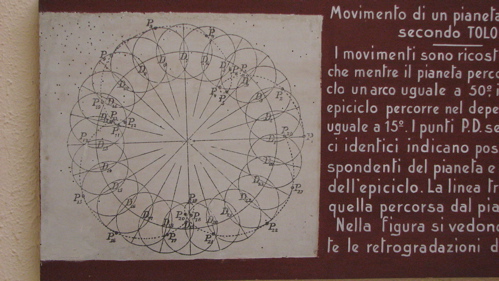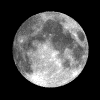
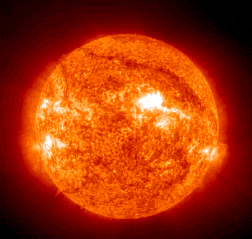
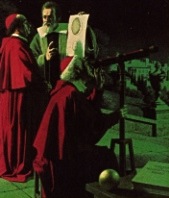

Our Debt to Galileo Galilei 1554-1642
"HIS CONTRIBUTIONS to scientific knowledge were so radical that he constantly had to discuss with his opponents not only what the facts were and what their best theoretical interpretation was, but also what the proper rules for establishing the facts and for interpreting them were."
p. 2.
His interest initially was "the nature of motion, in general and falling bodies in particular....His orientation was fundamentally Archimedean."
p. 3.
"the telescopic discoveries that began in 1609 led Galileo to a major reassessment of the Copernicanism, and so for the next seven years he was seriously and explicitly involved in astronomical research and discussions."
p. 5.
Two Worlds
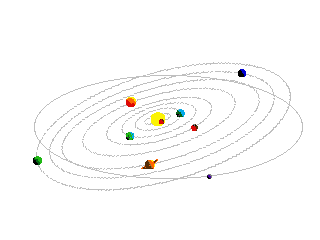
Ptolemy's concentric system

"I believe it may be that those who think in this manner may want to amplify the decrees of the Councils in favor of their own opinion.... However, the motion or rest of the earth or the sun are not articles of faith and are not against morals"
pp. 134-135.
"...moreover, one would have to forbid men to look toward the heavens, so that they would not see that Mars and Venus are sometimes very close to and sometimes very far from the earth; nor should they be allowed to see the same Venus appear sometimes round and sometimes armed with very sharp horns and many other observable phenomena which can in no way be adapted to the Ptolemaic system, but provide strong arguments for Copernicanism."
pp. 127.
"Therefore I think that in disputes about natural phenomena one must begin not with the authority of scriptural passages, but with the sense experiences and necessary demonstrations. For the Holy Scripture and nature derive equally from the Godhead.... nature is inexorable and immutable, never violates the terms of the laws imposed upon her, and does not care whether or not her recondite reasons and ways of operating are disclosed to human understanding."
"God ought first to be known by nature." Tertullian.
p. 116.
" ...we read the following words in St. Augustine:
"There should be no doubt about the following: whenever the experts of this world can truly demonstrate something about natural phenomena, we should show it not to be contrary to to our Scriptures."
p 126.
"They could also say that the word firmament is literally very appropriate for the stellar sphere and everything above planetary orbs, which is totally still and motionless according to this arrangement. Similarly, if the earth were rotating, then, where one reads 'He had not yet made the earth, not the rivers nor the poles to the terrestrial globe," on could understand these poles literally; for here would be no point in attributing these poles to the terrestrial globe if it did not have to turn around them."
p. 145.
Galileo Galilei, letter to the Grand Duchess Christina, 1615.
pp. 101-145.
start | debate | his words | interpretations

